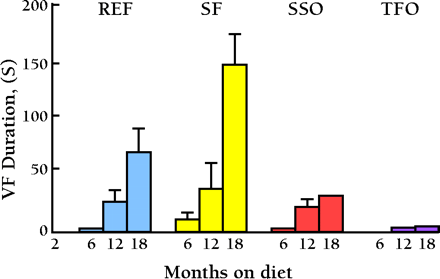
- Institution: Stanford Univ Med Ctr Lane Med Lib/Periodical Dept/Rm L109
- Sign In as Member / Individual
The “Heartbreak” of Older Age

Influence of age and dietary fat on the duration of ventricular fibrillation (VF) during reperfusion. The influence of dietary fat on myocardial vulnerability to arrhythmia was examined using coronary artery occlusion and reperfusion in the anesthetized rat as a whole animal model of ventricular fibrillation (VF) and sudden cardiac death. Animals were fed a reference (REF) diet alone or supplemented 12% by weight with tuna fish oil (TFO) (rich in ω3 PUFAs), sunflower seed oil (SSO) (rich in ω6 PUFAs), or sheep perirenal fat (SF) (rich in saturated fatty acids). Feeding periods of 6, 12, and 18 months and a total of 108 rats were used. The incidence of ventricular fibrillation in occlusion was reduced from 46% of REF animals to 6% and 21% in TFO and SSO groups, respectively, and increased to 68% in the SF-fed rats. The incidence of ventricular tachycardia was also reduced by TFO and SSO. The duration of arrhythmic episodes was increased by SF and reduced by TFO and SSO. The incidence of fibrillation on reperfusion of acutely ischemic myocardium (15 min. occlusion) was significantly reduced by TFO only (12%, REF = 50%, SSO = 30%, SF = 70%). Severity of arrhythmias increased with age as did the extent of dietary influence. Mortality from fibrillation, which only occurred in rats aged twelve months or older (REF = 13%), was increased by SF (43%) mainly in reperfusion (38%) but did not occur in TFO or SSO. These results indicate the potential benefit of dietary modification to include a higher proportion of polyunsaturated fat, especially fish oil, in reducing risk of sudden cardiac death. From (32).


